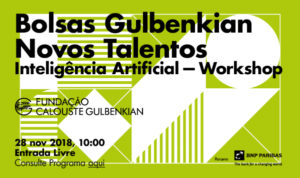——– Mensagem reencaminhada ——– Assunto: Pedido Data: Mon, 3 Dec 2018 13:50:26 +0000 De: Eduardo Fermé <eduardo.ferme@staff.uma.pt> Para: Paulo Novais <pjon@di.uminho.pt>
Boa tarde,
Podes difundir na rede Appia?
Obrigado,
E.
———————————————————
1 Posdoc Position – Applied machine Learning – formal methods applied to artificial intelligence
The NOVA LINCS Knowledge-Based Systems Group at Madeira University is seeking candidates for a PostDoc position to work within the scope of the following project: Project BRANT – Belief Revision applied to Neurorehabilitation Therapy (PTDC/CCI-COM/30990/2017).
Cognitive deficits are common after brain injury, dementia and in normal cognitive decline due to aging. Current cognitive rehabilitation therapy has been shown to be the most effective way to address this problem. However, a) they are not adaptive for every patient and b) have a high cost, and is usually implemented in clinical environments.
The Task Generator (TG) is a free tool for the generation of cognitive training tasks. However, TG is not designed to adapt and monitor the evolution of the patient. Here we propose BRaNT, an enhancement of TG with Artificial Intelligence modules, gamification and remote monitoring capabilities to enable Health Professionals to provide long-term personalized cognitive rehabilitation therapy at home. BRaNT is an interdisciplinary effort that addresses scientific limitations of current practices as well as provides solutions towards the sustainability of health systems and contributes towards the improvement of quality of life of patients.
Candidates should hold a Ph.D. or equivalent degree. Suitable disciplines include Computer Science, Artificial Intelligence, Mathematics, Machine Learning and other related areas. A strong publication record is considered a plus. Candidates are expected to be fluent in spoken and written English. PostDocs can, optionally, supervise MSc and/or PhD projects.
It is desirable that the candidate has the following experience/skills:
1. Knowledge in logic or formal methods applied to artificial intelligence.
2. Knowledge in Applied Machine Learning and Data Science.
3. Strong programming skills
Tasks will include, among others, to participate in a interdisciplinary team to perform:
(a) Patient Profile Generator
Based in normalized data in a database, we will create a assistive tool to create a patient profile which represents his/her cognitive competences. This training profile will be created by operationalizing tasks according to how their different parameters impact different cognitive domains (Attention, Memory, Executive Functions, Language, Processing Speed). This will be achieved by means of a participatory design methodology involving 20 rehabilitation experts and end-user groups. Through modeling we expect to quantitatively determine how independent variables (task parameters) impact each of the profile domains. For each patient, this profiling and parameter matching process will result in the selection of a number of tasks that are adjusted to the patient and delivered as the prescribed training.
(b) Belief Revision adaptation engine (BR-E: Adaptation).
The aim of this WP is to create the computational infrastructure based on the Belief Revision framework that will enable the accurate generation of cognitive profiles for patients, as well as the update of these profiles over time to accurately capture the patients’ evolution over time and the consequent adaptation of cognitive training (Belief Revision adaptation engine). The BR-E must be capable to detects inconsistencies (i.e., formal contradictions) and incoherencies (i.e., results between different assessment that are outside of expected differences). In case of normal evolution/involution the system will be update the profle accordingly and cycle the process with the updated profile.
Gross Salary: Approx. 36K€ x year.
The positions are available from 1/4/2018. The positions are fixed-term and filled initially for 1 year with the option to be renewed until the end of the project (30/9/21).
Applicants should express their interest by sending the following documents by email to Eduardo Fermé (ferme@uma.pt) no later than 20/12/2018, according to the instructions below:
– a cover letter briefly describing your background and interests;
– a Curriculum Vitae (with contact details);
– names and contact information (email) of at least two references;
– a link to electronic copy of Ph.D. Thesis (if available);
– links to electronic copies of 1-2 most relevant publications.

